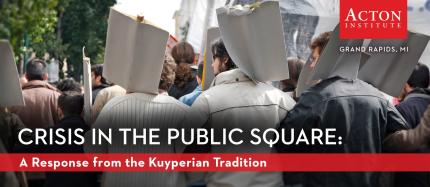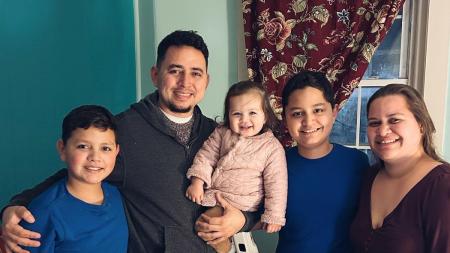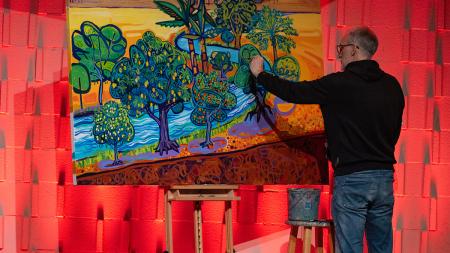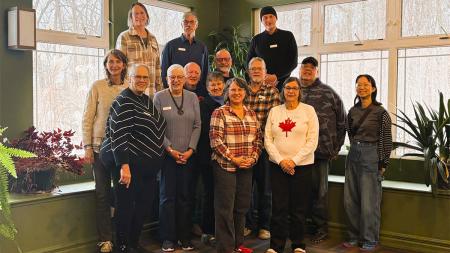Conference Addresses ‘Crisis in the Public Square’

Regardless of the outcome of midterm elections across the U.S. on Tuesday, deep divisions are likely to remain because people will continue placing their hopes in politics instead of God.
This was a key message that speakers presented during “The Crisis in the Public Square: A Response from the Kuyperian Tradition,” a two-day conference sponsored this week by the Acton Institute, a Grand Rapids, Mich., organization that works to integrate the ideas of religion and liberty.
“Political issues today are discussed with an unhealthy focus on sensation, a lack of emphasis on the truth, and attacks on opponents,” said Lucas G. Freire, assistant professor at Mackenzie Presbyterian University in São Paulo, Brazil, in a keynote address Monday afternoon.
“People have turned to catchy phrases and name calling. This crisis of dialogue relates to the excessive personalization of political life. We are seeing an obsession with charismatic political figures.”
These divisions are not limited to North America but are also evident in Freire’s homeland of Brazil, which recently had a contentious election, as well as in many other countries across globe, said Freire, whom the Acton Institute awarded this year’s Novak Award (named after American theologian Michael Novak) for the work he is doing on issues related to the ideas of Abraham Kuyper.
The goal of the conference was to discuss how the thought of Kuyper, a 19th-century Dutch theologian, author, and politician, could help to change the course of public dialogue and its ongoing hostility by emphasizing the sovereign role God plays in all of life.
In advertising the conference, the Acton Institute’s website said, “Cultures are clashing both in Europe and in the United States as refugees from the Middle East and Central America seek asylum. . . . Political dialogue has become toxic. Sometimes the very foundations of a free and open society are met with deep skepticism.”
To address these significant issues, the institute brought in speakers who drew upon the work of Kuyper “to present possible solutions for rediscovering civic virtue and building a society in which all may flourish.”
“The conference illustrated an ongoing interest in Abraham Kuyper and the search for categories and insights that will help us navigate questions and challenges of faith, society, and culture in our current times,” said Jul Medenblik, president of Calvin Theological Seminary, who attended the event.
“When you see people from Brazil and China join the conversation, you are aware of the worldwide need and reach of this conversation.”
Abraham Kuyper was an early proponent of utilizing the concept of a Christian worldview. Kuyper famously said, “There is not a square inch in the whole domain of our human existence over which Christ, who is Sovereign over all, does not cry: Mine!”
“At the roots, the challenges we are facing today are spiritual and require (as Kuyper believed) a comprehensive worldview of the person and social life,” said Freire. “Either we use the structures created by God to honor God, or we put our emphasis on idols, as we are doing today in the realm of politics. . . . The church can improve the quality of our conversations,” but the church should not “impose its quest for authority on others.”
Other speakers included Richard Turnbull, an Anglican priest and director at the Center for Enterprise, Markets, and Ethics in Oxford, England. In his talk he spoke of how John Calvin, on whose thought Kuyper drew, “liked civil government overseen by religious doctrine. . . . He believed there was a triune God over the whole of the cosmos.”
On Tuesday morning, a panel addressed “Kuyper’s Theology in International Perspective.” This included Pavel Hanes, a theologian from Slovakia who spoke about how the Kuyperian tradition can engage with the problems affecting post-communist states where, even several years after the fall of the Iron Curtain, there remains the expectation that the state, not God, “is my father.”
Mary Ma, a research fellow at Calvin College’s Henry Institute for the Study of Christianity and Politics, discussed how in China the state is trying to “stifle all other spheres of society.” She said, “I believe Kuyper can bring some corrections.”
Also on the panel was Manfred Svensson, head of the philosophy department at the University of the Andes, Chile. He described how the driving force of economic globalism can go wrong and needs to “be under the sovereignty of God.” He said, “We must share resources and information, but we can’t exclude others. We can use globalism in a moral way that pleases God.”
Finishing the conference on Tuesday morning was Miroslav Volf, a professor of theology at Yale University and coauthor of the new book For the Life of the World: Theology That Makes a Difference.
Tuesday’s midterm elections, Volf said, would not resolve two of the biggest questions facing us today — Who are we? and In whom do we put our trust?
As part of his presentation, Volf compared society in North America to a man who decided that his great passion in life was to become an artist. But first he had to have everything he needed before he could paint his masterpiece.
“We are like that painter who was obsessed with the tools of his trade,” said Volf, who is from Croatia and lived there in the mid-1990s during the war for independence from Yugoslavia. “He needs a good studio, the right paper, and so on. But all of his time is spent ensuring he has the means, and he never ends up painting.”
The means are turning into the end for many people, whether it be getting the right education, landing a high-paying job, becoming fit and looking good, or seeking to have many followers on Facebook. Today the ends tend to be a matter of ego and are quickly disregarded for the next attractive dream.
As a result, said Volf, many people are ignoring the claims that religious traditions teach us about living a good life, which is often about setting aside ourselves to work for the common good.
“Today, the major institutions, often including religious groups, are organized to help us acquire the resources to achieve our ends — to follow our dreams, even if those dreams keep changing and we put them aside for something else.”
Instead of building a society whose aims are toward higher ends and toward less hostility and division, said Volf, the state today sees its purpose as satisfying the desires of people to be happy and avoid suffering. “States are increasing resources to bring security to our lives and make sure the market functions so we can pursue our dreams.”
Volf spoke of how Satan approached Jesus in the desert and tempted Christ to satisfy his hunger by turning stones into bread (Luke 4:1-4). But Jesus answered, “It is written: ‘Man shall not live on bread alone.’”
“We live in a time where our major institutions are turning stones into ever-more sophisticated forms of bread,” said Volf.
At their roots, the world’s major religions offer an alternative to this common view of always wanting more by “articulating how we can live lives of purpose and offer a vision of the true good and the flourishing life.”
As a Christian, Volf said, he believes it is crucial for people to learn more about faith traditions and to adopt a value system, even if it is different from Christianity, that looks toward living with a higher purpose.
“We need to be able speak in our religious voices,” in the appropriate time and place, “and yet recognize the right of all actors to do the same,” he said.
The archived livestream can be viewed here.


